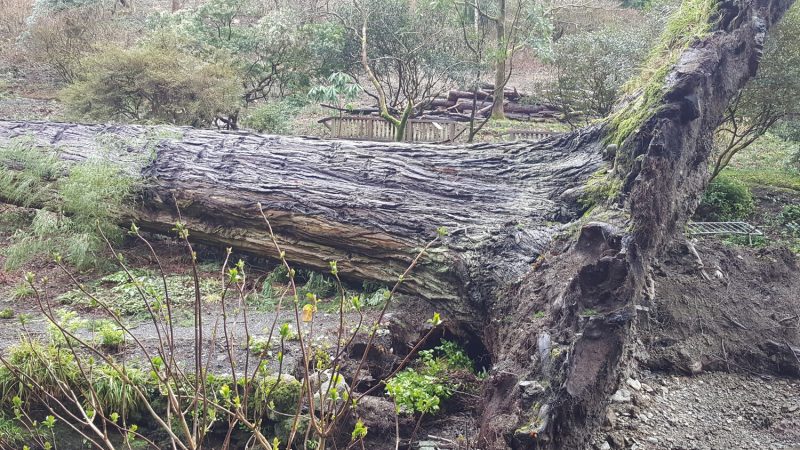
This is harder than I thought! I’ve taken notes each day but it’s taken a while to go live on here. With deadlines and commitments, under pressure I’m less open to the world. I’d planned to walk an hour locally each day and take a bag to collect litter but the first week I kept forgetting the bag. I start to wonder what in fact my one small change is – is it spending an hour outside paying more attention to the world around me, or is it picking up litter? Or maybe there’s a whole lot more going on once I start to pay attention.
Days 1-4: A fall and a realisation
I notice a pattern of oversleeping and then rushing to get out with enough time before work, forgetting a bag for litter. Each time as I realise I’ve been on autopilot I have to make an effort to breathe and retune, slow my walk, move away from my tumbling thoughts and focus on the world around me. I start to notice fresh sprouting green leaves, the shape of winter-worn ferns, blackbirds singing, and a wren. I alternate between my mind and the world around me, pushing myself to focus outward like I’m forcing down medicine. Towards the end of each hour my shoulders ease, I feel lighter and breathe easier. I notice small birds flitting in the branches above and a couple of times I hear the deep reverberations from a woodpecker. I get distracted and forget time a little, reluctant to return to the office. But I realise I’m refreshed, energised and more focused when I start work.
Towards the end of the week I was invited to an event at Bodnant Gardens and afterwards spent an hour walking around with my friend explaining different plants to me. We see the damage from recent winter storms, the giant redwood still impressive as it lies there, its shallow root system upturned. Further on we see a tree we don’t recognise and walk down the damp grassy bank. One moment I’m upright, the next I’m slipping, reaching out my arm to grab hold of nothing, landing heavily on the muddy bank. This is not what I meant by connecting with nature! I smile, nudging myself to see the funny side of the situation, thankful the event is over and I don’t have to carry the mud back inside for all to see, thankful that the soft bank inflicted no pain.
Later, as I wash mud off my jeans and coat I think about the old redwood, growing half way across the world from its native habitat, once so tall, now still majestic as it lies and dwarfs us humans with its roots. I reflect on my slight embarrassment and my need for cleanliness as a barrier between me and the world. Not always an unhealthy one, but more pronounced than it needs to be? Is this also why I’ve been inwardly resisting picking up litter? Or am I consciously turning my head and preferring not to see or think about it?
Days 5-6: Fairy trees and water in the air
It is easier to get out for an hour each day at the weekend, and less solitary. Drawing friends and family in means it feels less of a challenge to actually get outside, but fully engaging when I’m outside with others is harder as it’s easy to get distracted talking. Walking to a local waterfall I turn the focus of conversation outward, pointing out the stunted, wizened-looking hawthorn trees, hunched against the elements. My friend tells me in Ireland they’re called fairy trees. I love discovering this kind of old local knowledge from elsewhere, it helps me see the world around me differently, as more alive. And it reminds me how intertwined humans have always been with the more-than-human world.
The waterfall when we reach it breathes new life into my tired hungover self. The cool dark wet rock and white foamy spray are a sight and sensation for my sore eyes and body. I feel my muscles relax, tension slipping down like the water. The damp mineral air feels life-giving.
Running early next morning along the seafront with my sister I feel the same effect, despite the strong wind against me. I breathe heavily tasting the briny air. I hear oystercatchers and see other seabirds circling or picking along the shore. I feel I am noticing more and taking more in than I did before this challenge. And I can feel something inside myself responding in a good way.
Days 7-11: Overcoming internal resistance, feeling a little empowered
Finally I start taking a bag with me, at least for my morning walks. It feels satisfying to act rather than turn my head to walk by, suppressing it. It’s hard overcoming the feeling of disgust at the rubbish, the top of a soft drink with a chewed straw sticking out, a clear plastic container with brown sludge inside. I gingerly shake it out and put it in the bag, thinking maybe a litter picker could be a good investment, especially for the harder to reach bits. But picking up all this stuff is also making me think more about everything I use in everyday life which I ultimately put in the bin myself. Do I really need to buy more, to pick up more, to dispose of more? I’m still weighing that up.
Towards the end of the week I feel stronger and more motivated, but then a trip away throws me out of my routine, I don’t have my cloth bag with me and a few times I’m out and I don’t pick up the litter I see unless there is a bin nearby. Somehow it’s important to me to have a bag to put it in, rather than carry rubbish around openly in my hand, a constant reminder of the excess of human consumption and waste. I did that a few times too, and it was still satisfying to put a crisp wrapper or drinks bottle in the bin once I found one, but the feeling of disgust lingers more and distracts from my enjoyment of being out and about. I want to do my bit but I don’t want to constantly think and feel down about all the rubbish! Then I’m reminded of images of people living and working around huge rubbish dumps in other countries, inundated with the world’s waste, picking through never ending piles and piles on a daily basis.
And here I am also gaining huge pleasure from spending more time out and about in my own comparatively very privileged neighbourhood. I hear a chiffchaff for the first time this year, and then see it sitting on a branch. It’s an exhilarating moment and I feel glad that I am starting to confront my internal barriers and engage more with both the good and the bad in the world around me. I’m starting to let myself care a little more constantly.
Days 11-16: A small strategy that keeps me going
I feel better in myself since starting to pay attention and picking up the litter I see. Though sometimes it is too much for my bag, or the plastic is so deeply embedded in a river bank that I can’t get it out and I feel hopeless and powerless again. I have to remind myself that what I can do is still better than nothing.
I’ve also now got into the habit of carrying a bag in my coat pocket. I suppose I’ve created a little system for myself. I realised that I nearly always have a cloth bag for shopping (being half-German and having lived in Germany this goes back decades for me) but I don’t want to use the same bag for shopping as for rubbish – there’s that disgust factor again. So now I’ve started carrying a different, dedicated one in a little zip purse (for hygiene reasons) in my coat pocket for litter. These small actions of mine still feel miniscule compared to the huge problems of overproduction, overconsumption and the resultant waste, destruction and contamination, but at least something is starting to shift within me. Maybe more change will come.
I heard starlings this morning mimicking the screeching of swifts in summer. Momentarily disorienting, it strongly evoked for me the feeling of summers past. And brought wonderings about summers to come. Swifts are struggling, I know. Starlings too. A reminder again of how interwoven we all are.
-
 Mwininumbu Osman Salifu commented on Day 16: Half way summary 3 years ago
Mwininumbu Osman Salifu commented on Day 16: Half way summary 3 years agoWhen you connect with the environment outside, you’ll come to realize that there’s more that captures your attention than the small piece of a challenge that we embark in. I hope you’re getting along despite your busy commitments. Respond
-
 Shandin Rickard-Hughes commented on Day 16: Half way summary 3 years ago
Shandin Rickard-Hughes commented on Day 16: Half way summary 3 years agoChristie, wow. I absolutely loved reading your reflections, very evocative and clearly some important self work going on, trying to slow tour mind and engage in your surroundings. I can sympathise so much with what you've shared about your experience. You have a lovely writing style, too. Respond
-
 Alf Coles commented on Day 16: Half way summary 3 years ago
Alf Coles commented on Day 16: Half way summary 3 years agoI echo Shandin's comments about loving reading this Christie. And isn't it odd how naming the thing that might be getting in way (e.g., disgust) can help look at it, not be caught in it, and strategise how to do something different. I'd be really interested to read your reflections in relation to this week's cCHANGE prompts, thinking about system change related to our challenges. Thank you for posting! Respond
-
 cCHANGE Team commented on Day 16: Half way summary 3 years ago
cCHANGE Team commented on Day 16: Half way summary 3 years agoHi Christie, Leonie from cCHANGE here! Thank you for your lovely reflections, I feel like I am there beside you. It's so interesting to read your reflection on disgust around the litter. How you reflected on where the disgust was coming from and reframed it when you thought of others in the world working in waste dumps daily. It was also interesting to read that you created a system for yourself in the last few days there, making it easier to adopt the habit. Is connecting with nature coming a little easier and automatically too, or does it depend on the day? Last week we talked about systems. When you are walking do you ever think about how your challenge interfaces with different systems around you? For example, it could be planning systems, work and academic systems and the way we live our lives and use our time, waste and recycling systems, nature conservation, etc. Yesterday's post was also about courage. What's do you think about courage? Could it be a useful quality to create a more equitable and sustainable world? I look forward to reading your updates, when you have a chance. Warm wishes, Leonie Respond
You must be logged in or have the proper rights to post a comment.